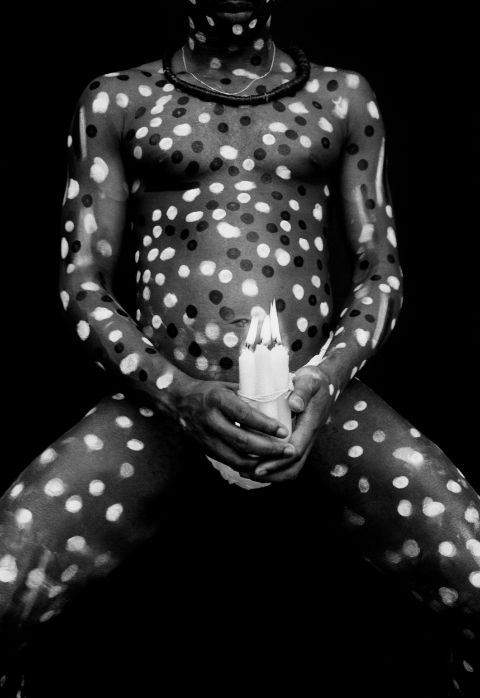Rotimi Fani-Kayode

Sonponnoi (1987) © Rotimi Fani-Kayode Courtesy of Autograph, London
A seminal figure in Black British photography circles in the 1980s, Rotimi Fani-Kayode’s practice was informed by an unflinching interrogation of the intersections between queerness, spirituality, and the African masculinized body. Produced in 1987, Sonponnoi shows the almost naked torso and thighs of a young Black man. Black, white, and pink spots are painted on the figure’s body, whose hands hold five candles—each lit with glowing tongues of fire—between his thighs. Sculptural representations of the Yoruba god of earth and disease, Ṣọ̀pọ̀na, referenced by the work’s title, often depict him as covered with coloured spots. Yet Ṣọ̀pọ̀na is also the god of healing in Yoruba mythology—emphasizing the nuance between and around binaries such as healthy/diseased. One of Fani-Kayode’s last works Every Moment Counts shows the naked back of a young Black man, who is crunched forward in a pose that makes him particularly vulnerable to the photographer’s—and the viewer’s—gaze. A hand, emerging from between his legs, grabs his buttocks from below, heightening the tension of the composition. A white mask, evoking the one plague doctors are said to have worn in the seventeenth century is flanked by thin strands of black hair. The work highlights the spectral threat that HIV posed to queer communities in the 1980s, and the disproportionate exposure Black queer people faced due to both stigma and racism in the health sector and beyond. Fani-Kayode’s bold subversion of Yoruba symbols and systems of representation continue to signal horizons of freedom and resistance for queer Africans today.
Works in the exhibition: Every Moment Counts (1989), photography, 120 x 120 cm; Untitled (1987–88), photography, 120 x 120 cm; Untitled (1987–88), photography, 120 x 120 cm. Courtesy of The Walther Collection, Neu-Ulm